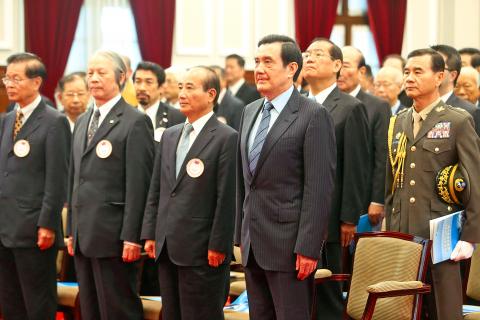A survey released yesterday found 52.7 percent of respondents said that President Ma Ying-jeou (馬英九) failed to defend Taiwan’s sovereignty and dignity in his meeting with Chinese President Xi Jinping (習近平) in Singapore on Saturday last week.
The poll, conducted by Taiwan Indicator Survey Research, also found that 56.2 percent of respondents said that Ma’s statement in the meeting does not represent their views, with only 22.2 percent saying that Ma represented their views.
The poll showed that almost half of the respondents — 49.6 percent — agreed that the Ma-Xi meeting benefited China, while only 20 percent said they believed the meeting benefited Taiwan.

Photo: CNA
Only 28.6 percent of the poll’s respondents agreed with the statement that “both sides across the Strait belong to one China,” which Xi declared in the meeting’s closed-door discussion session, while 58.4 percent disagreed, the poll showed.
Although Ma repeatedly emphasized that he had “said all that should be said” in the meeting and that he had not only addressed the “one China, with each side having its own interpretation” (一中各表) formula, but had also reiterated the Republic of China’s sovereignty, only 30.2 percent believe that Ma had defended national sovereignty and dignity, the poll said.
The poll also showed that 42 percent of respondents said that Ma is “pro-unification,” the highest percentage on record since July 2011.
However, the poll also showed that 73 percent of respondents support regular meetings between Taiwan and China’s leaders, while only 14.5 percent said they oppose such meetings.
Meanwhile, the poll found Democratic Progressive Party presidential candidate Tsai Ing-wen (蔡英文) continued to pull further ahead of her opponents with 46.2 percent support.
Chinese Nationalist Party (KMT) presidential candidate Eric Chu (朱立倫) has 20.4 percent support, while People First Party presidential candidate James Soong (宋楚瑜) trailed at 10.4 percent, the poll said.
The survey collected 1,004 valid samples from Sunday through Tuesday and has a margin of error of 3.1 percentage points.

NATIONAL SECURITY THREAT: An official said that Guan Guan’s comments had gone beyond the threshold of free speech, as she advocated for the destruction of the ROC China-born media influencer Guan Guan’s (關關) residency permit has been revoked for repeatedly posting pro-China content that threatens national security, the National Immigration Agency said yesterday. Guan Guan has said many controversial things in her videos posted to Douyin (抖音), including “the red flag will soon be painted all over Taiwan” and “Taiwan is an inseparable part of China,” while expressing hope for expedited “reunification.” The agency received multiple reports alleging that Guan Guan had advocated for armed reunification last year. After investigating, the agency last month issued a notice requiring her to appear and account for her actions. Guan Guan appeared as required,

A strong cold air mass is expected to arrive tonight, bringing a change in weather and a drop in temperature, the Central Weather Administration (CWA) said. The coldest time would be early on Thursday morning, with temperatures in some areas dipping as low as 8°C, it said. Daytime highs yesterday were 22°C to 24°C in northern and eastern Taiwan, and about 25°C to 28°C in the central and southern regions, it said. However, nighttime lows would dip to about 15°C to 16°C in central and northern Taiwan as well as the northeast, and 17°C to 19°C elsewhere, it said. Tropical Storm Nokaen, currently

‘NATO-PLUS’: ‘Our strategic partners in the Indo-Pacific are facing increasing aggression by the Chinese Communist Party,’ US Representative Rob Wittman said The US House of Representatives on Monday released its version of the Consolidated Appropriations Act, which includes US$1.15 billion to support security cooperation with Taiwan. The omnibus act, covering US$1.2 trillion of spending, allocates US$1 billion for the Taiwan Security Cooperation Initiative, as well as US$150 million for the replacement of defense articles and reimbursement of defense services provided to Taiwan. The fund allocations were based on the US National Defense Authorization Act for fiscal 2026 that was passed by the US Congress last month and authorized up to US$1 billion to the US Defense Security Cooperation Agency in support of the

PAPERS, PLEASE: The gang exploited the high value of the passports, selling them at inflated prices to Chinese buyers, who would treat them as ‘invisibility cloaks’ The Yilan District Court has handed four members of a syndicate prison terms ranging from one year and two months to two years and two months for their involvement in a scheme to purchase Taiwanese passports and resell them abroad at a massive markup. A Chinese human smuggling syndicate purchased Taiwanese passports through local criminal networks, exploiting the passports’ visa-free travel privileges to turn a profit of more than 20 times the original price, the court said. Such criminal organizations enable people to impersonate Taiwanese when entering and exiting Taiwan and other countries, undermining social order and the credibility of the nation’s